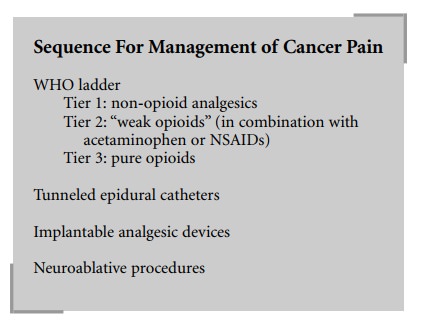Chapter: Clinical Cases in Anesthesia : Cancer Pain Management
What is the WHO ladder?
What is the WHO ladder?
The World Health Organization (WHO) has devised
a protocol for treating pain utilizing a tiered approach. This protocol allows
for the use of less potent medications initially (first tier), increasingly
more potent medications (next tiers) being added in a stepwise approach until
the patient is comfortable. The WHO states that about 85% of cancer patients
can be kept comfortable using this protocol.
First-tier medications include non-opioid
analgesics such as nonsteroidal anti-inflammatory drugs (NSAIDs), tricyclic
antidepressants (TCAs), and anticonvulsants. Second-tier medications include
“weak opioids,” which have ceiling dosages due to their combination with
acetaminophen or NSAIDs. Third-tier analgesics in the WHO ladder include all
sole opioid preparations, both short-acting and extended release. Despite the
addition of large doses of opioids in the third tier, the non-opioid
medications from tier 1 should be continued. A good knowledge of opioid
equipotency conversions is necessary to be able to change from one opioid to
another.
The WHO ladder can be further extrapolated
clinically to include invasive techniques. Thus, oral analgesics are tried
first, followed by intravenous opioids, analgesia via tunneled epidural
catheters, implantable analgesic devices, and finally neuroablative procedures.

Related Topics